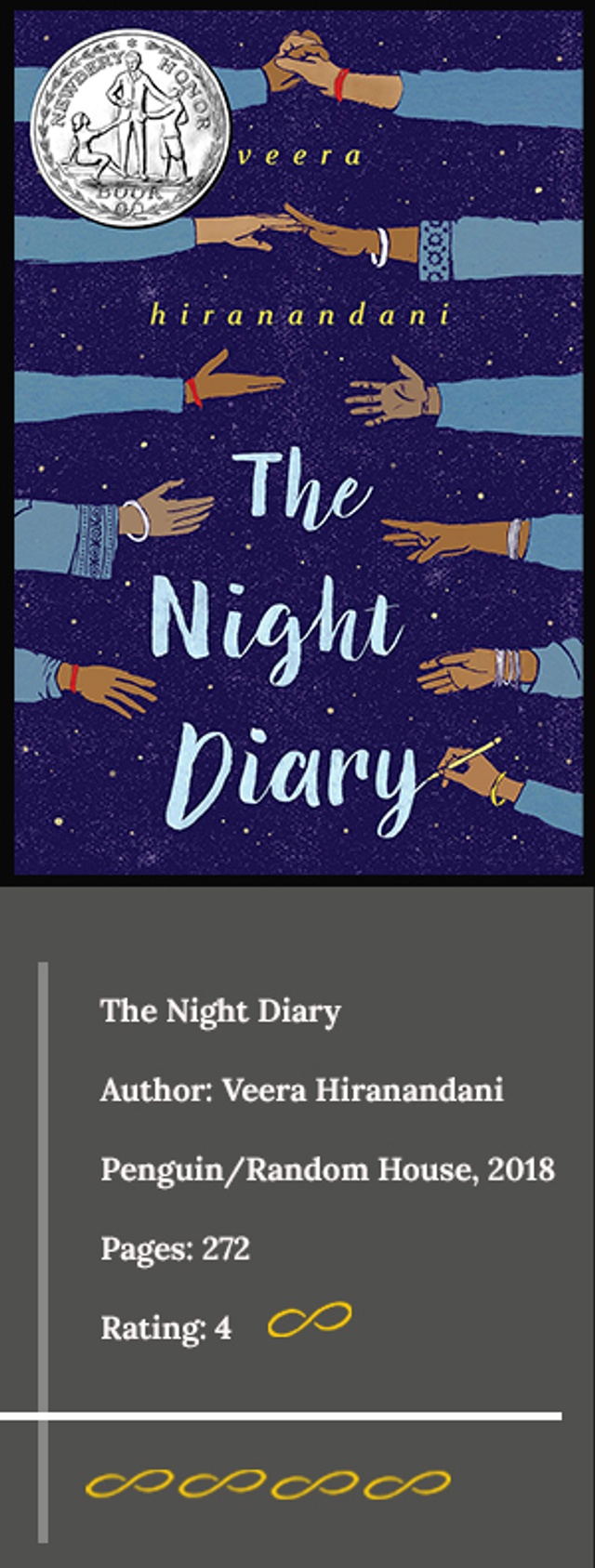A Review of The Night Diary
If you like realistic fiction and adventure, then you should read The Night Diary by Veera Hiranandani.

This book is about a quiet 12-year-old Hindu girl named Nisha and her family’s journey out of Pakistan after India is freed from British rule. The Night Diary is written in the form of letters from Nisha to her mother, who died giving birth to her and her twin brother, Amil. At the beginning of the book, this format is hard to follow because it seems like Nisha is always talking to someone else, yet there is minimal dialogue. However, as the story goes on, it gets easier to understand and more interesting.
Two themes of the book are family and sticking together. As the story progresses, Nisha and her family endure hardships, are forced to leave their home, and grow closer as a result. Her grandmother, Dadi (Dadi means grandmother on the paternal side in Hindi, Sindhi, and Urdu), loves her but is distant and doesn’t know how to handle Amil and Nisha. Her father is rarely home due to long work hours and, when he is home, he treats Amil poorly because Amil can’t focus or read.
Nisha, Amil, and the family’s cook, Kazi, have always been very close. However, Nisha and Amil are Hindu and Kazi is Muslim. This may not have been a problem before, but after becoming free from Britain, India and Pakistan are separated, and Hindus, Muslims, and Sikhs are forced apart. Nisha believes that they are citizens of the same world and that people don’t need to separate; in fact, she is not even sure why they are separating. However, not everyone shares Nisha’s views on citizenship, and Nisha’s family is forced to leave Kazi behind in Pakistan, along with some of Nisha’s cousins. This completely changes their lives and the lives of many other citizens of Pakistan and India.
There are two main events that bring Nisha’s family closer. After being forced to leave Kazi, Nisha’s family begins to run out of water. Amil and Dadi become very sick. Amil nearly dies, and this shows Dadi and Nisha’s father how horrible life would be without Amil. Nisha’s father begins to treat Amil less like an annoying toddler and more like an adult. The second way Nisha’s family gets closer is through Nisha’s mother’s brother, Rashid Uncle. On their journey to India, Nisha and her family stop at his home to rest. He brings their family closer by giving them a temporary home and getting to know Nisha and getting her to talk more during the time she stays with him. He also convinces Nisha’s father to be a little kinder and more open.
The family’s stay at Rashid Uncle’s causes most of Nisha’s character development; she becomes much more brave, talkative, and open. However, an event at the end of their stay causes Nisha to become even more reclusive. In my opinion, this is the most interesting part of the book, because it shows Nisha and Amil learning to socialize with others. They didn’t have many friends at home, so it is very interesting to see how they make friends with a Muslim stranger. This part of the book also conveys more emotion from Nisha than almost any other. For example, it really goes in depth about her feelings for her mother and Rashid Uncle. The content about her mother also elaborates very well on the beginning of the book, and I found that very interesting.
Although it’s a great book, The Night Diary gets off to a slow start. At the beginning of the book, there is a large amount of background information about Nisha’s daily life, some of which feels unnecessary. However, about 60 pages into the book, it gets more interesting. The book also tells the reader about some history and provides an education on different cultures. Hiranandani writes about the need for doctors in India, portrays a significant moment in India and Pakistan’s history (during the partition of 1947), and tells the reader about some leaders from that time period. Veera Hiranandani is an amazing author and she adds lots of descriptive language, like “I could hear the low buzz of men’s voices, but they didn’t sound angry or scary” (page 105). The beginning of this sentence shows one example of descriptive details in this book.
In conclusion, I rate this book four out of five stars because of the descriptive details and character arcs. I did not rate it five stars because, at the beginning of the book, there is very little emotion from Nisha and Kazi, and the book mostly talks about Nisha’s mother and the past. The final reason the plot is slow at the beginning is that Nisha is clueless about the partition, so nothing seems tied together. But this taught me a lot about how fast changes in a community like this can come and how hard they can be for some people, especially when they lack sufficient resources, like water. This book also taught me how important it is to be educated about events like these. The Night Diary is aimed at ages 10 and up, but I would totally recommend it to anyone who likes history, adventure, or realistic fiction.

Jack Green is a member of the New York City Editorial Board.
